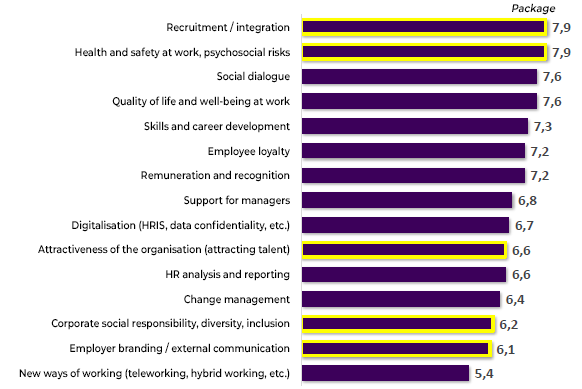How CSR spills over into HR and quality functions

The topic of CSR has taken on a new dimension with the vote on the CSRD Sustainability Reporting Directive at the end of 2022. A company’s non-financial performance will be measured as rigorously and in as much detail as its financial performance. An exercise that will require meticulousness, at least as much as for a quality process! Beyond this news, it’s a fact: as the issue of corporate social responsibility continues to grow, it is no longer the sole preserve of the CSR manager, and is now spreading to other strategic top-management functions: the quality function, for example, but also human resources. Two studies commissioned by the AFNOR group in 2022 highlight this trend. The first, which can be downloaded here, was conducted with 700 quality decision-makers by the BVA institute. The second, which can be downloaded here, surveys a thousand HR decision-makers in the public and private sectors.
Performance and transparency
How are quality and CSR linked, and how can a chief quality officer fit into the role of chief sustainability officer? What links the two spheres are the notions of performance and transparency,” sums up Karine Georges, head of research for the AFNOR group. The notion of quality is strongly determined by customer satisfaction. Today’s customers are no longer satisfied simply with the product or service they have purchased. It is now also the case that the company reflects its values and principled behavior, without hiding anything. “The quality manager must therefore integrate these expectations. ” The challenge for quality is that everything we say must be justifiable. It’s not just a question of writing on a jar ‘made with milk from our farmers’, it has to be the truth, and we have to be able to prove it! “says a quality specialist in the agri-food sector. The quality manager is thus drawn into the adventure as a proof specialist. Within the AFNOR group, this is the case: the quality department is in charge of the CSR approach. The function’s theme is clearly identified. In our survey, quality decision-makers cited CSR as the3rd most important issue of today and tomorrow, after the ecological transition (which is one aspect of it) and automation.
CSR, today and tomorrow’s challenge for quality decision-makers


Céline Marotte, QSE Manager at Paturle Aciers
Paturle Aciers, a small business based in the Isère region, has also incorporated CSR into its quality management system. Céline Marotte, the QSE manager, reports on the approach to the general management team, whom she has trained in the subject. She confirms that transparency is the notion that links the two universes, but proposes another: “Transparency is the notion that links the two universes. The 2015 version of ISO 9001, which shares a common structure with other major management system standards, invites us to look beyond the customer relationship and extend the notion of satisfaction to other stakeholders: suppliers, local partners and employees. This brings us to the issues of ethics, meaning and trust, and to the three pillars of corporate social responsibility: the environment, social responsibility and local responsibility. “she explains.
With this in mind, the quality manager also comes to play a role as a driver of change: “. Most companies are in the process of transforming (…). The aim is to see how the quality department can support this transformation strategy, to help formalize these transformations and consolidate best practices. “says a qualitician in the IT sector. A move that also involves the HR department! When a company’s business model changes, as is the case with CSR injunctions, it’s the role of the HR function to support these changes and adapt skills and professions,” explains Damien Monier, Director of Human Resources, CSR and Heritage – a triple hat! – from Paredes, specialist in professional hygiene. Property department employees, for example, now have to think in terms of energy savings and water reuse. Marketers no longer have to sell a product, but its use, the way it has been designed and how it will be used at the end of its life. So many new skills to acquire. “
Attractiveness and employer brand

Damien Monier, Director of Human Resources, CSR and Heritage at Paredes
Another aspect that has led HR functions to embrace CSR is the issue of attractiveness and employer brand. A company without a CSR policy would be out of the running in the job market,” asserts Damien Monier.. Candidates, as well as external partners and internal employees, expect it to provide meaning, consideration, exemplarity and best practices. ” This affects the social climate, and the social climate is the HR function’s playground. As a result, the company finds itself at the heart of CSR issues, as well as being naturally at the forefront of quality of working life issues, if we want to link them to the wider CSR galaxy. However, the AFNOR study shows that CSR in the strict sense of the term ranks only 13th in the top 15 HR topics considered important today. And second to last in the list of those to which the organization devotes effort, a list dominated by the item “change management and new ways of working”. ” The decision-makers we interviewed were unanimous in saying that CSR is a subject for the HR sphere, but also that they would like to do more about it, because they can’t find the time to devote to the fundamentals of the business, such as health and safety, payroll and employee representative bodies,” analyses Karine Georges.
HR topics rated from 1 to 10 according to importance today
 The proof: 55% believe that HR departments should contribute to the company’s CSR policy in the same way as others in the organization chart, compared with 22% who feel that this should be the prerogative of a dedicated mission, reporting to general management (9% even claim that it should be the responsibility of the HR department and no one else). ” HR managers are at the forefront of CSR issues. They are in charge of everything to do with the social pillar. “concludes Olivier Graffin, health, safety at work and sustainable development coordinator for the AFNOR group, in an interview with Parlons RH. It’s an opportunity to bring this pillar, often overshadowed by the environmental pillar, but just as important.
The proof: 55% believe that HR departments should contribute to the company’s CSR policy in the same way as others in the organization chart, compared with 22% who feel that this should be the prerogative of a dedicated mission, reporting to general management (9% even claim that it should be the responsibility of the HR department and no one else). ” HR managers are at the forefront of CSR issues. They are in charge of everything to do with the social pillar. “concludes Olivier Graffin, health, safety at work and sustainable development coordinator for the AFNOR group, in an interview with Parlons RH. It’s an opportunity to bring this pillar, often overshadowed by the environmental pillar, but just as important.